





We adapt the kid to kindergarten
It seems, quite recently you brought the baby from maternity hospital, but time flew by, and here it is already going to join the first in life children's collective. How to prepare the child for visit of a garden? What needs to teach him to facilitate adaptation process? What to tell and how to behave that the kid transferred changes in the life without serious consequences? Let's try to find answers to these questions.
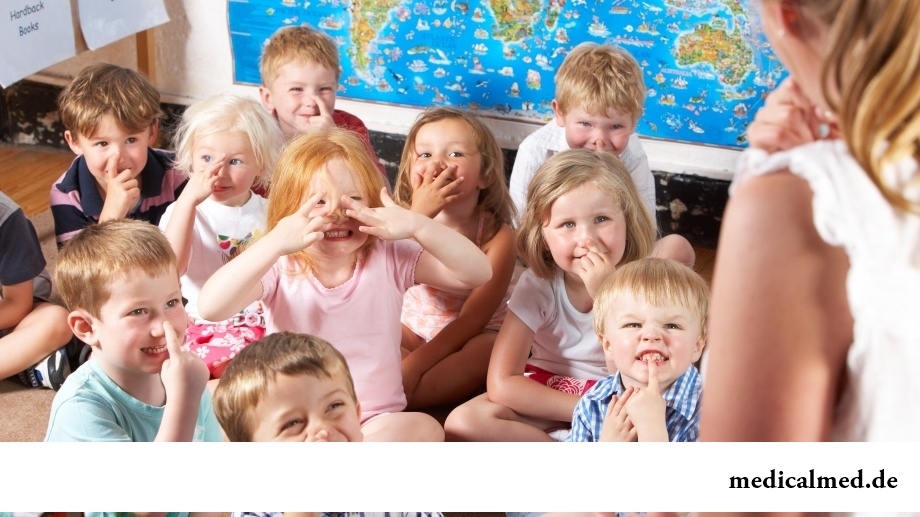
Requirements to the state of health of the child
According to acts of the Russian Federation, the kids coming to kindergartens have to be carefully inspected. On each child the special map in which data on his family, chronic diseases, level of physical and mental development, the carried-out vaccination are entered is made out. The document is processed by the local pediatrician, and he recommends specialists doctors who have to examine the kid. It:
- Surgeon;
- Otolaryngologist;
- Oculist;
- Stomatologist;
- Orthopedist;
- Neurologist;
- Dermatologist;
- Endocrinologist;
- Psychologist.
The conclusions of specialists remain urgent long enough therefore the examinations conducted within a year before design of the card do not need to be repeated. For children 3 years are more senior also visit of the logopedist is necessary. Besides, results of the next laboratory researches are brought in the card:
- General analyses of urine and blood;
- Blood test on determination of content of glucose;
- The analysis a calla on eggs of worms;
- Scraping on an enterobiosis.
Researches should be done as it is possible closer to date of transfer of the map in a garden as results of some of them quickly become outdated. At the time of final execution of the document also the certificate of lack of contacts of the child with infectious patients within the last week is introduced in it.
If the kid by the time of drawing up the card received all planned inoculations, information on them is entered in the document by the local pediatrician. Happens that vaccination were not made on medical indications or according to the decision of parents. All necessary data on it are also fixed in the document. Lack of inoculations cannot become a cause of failure from transfer in preschool institution, but the health worker of a garden has to be informed on this circumstance.
Recently the Ministry of Health of the Russian Federation made the offer on cancellation of obligatory medical examination of the children coming to kindergartens. The sense of the project consisted that children have to undergo many inspections already in a certain age (for example, in one or two years), and visits to specialists doctors at design of the "sadovsky" card at the same time turn into mere formality (especially considering huge load of doctors of children's policlinics). It was expected that the amendment to laws on health care and education will be adopted by September 1, 2015, but it did not happen. Therefore, the provision on obligatory medical examination continues to work so far.
The official list of diseases at which the child cannot be admitted to kindergarten, does not exist. However it does not mean that features of the state of health of the kid should not be considered at registration in preschool institution. For the kids having chronic diseases there are special gardens in which individual care and the dosed loadings will be provided to them. According to the recommendation of doctor child have to issue in establishment for visually impaired or hearing-impaired, kids with the corresponding degree of a delay of mental development, an allergy, endocrine disturbances, musculoskeletal system problems etc. Parents should show consideration for a professional advice not only because in specialized kindergarten optimum leaving will be provided to their children. Such institutions carry out also work on correction of disfigurations of the little pupils and their preparation for school that can not always competently be made in usual kindergarten and even in a family.
Widespread problem: the baby does not want to go to a garden
Happens that documents are ready, issues with registration are resolved, and it seems that all troubles behind, but here parents face an unexpected problem: the child refuses flatly to go to a garden. No arrangements help, and every morning turns into an infinite hysterics. In this case you should not think that the garden is bad or your child did not get used yet. More likely, it you made several mistakes which should be corrected now.
First of all, the kid needs to be trained for visit of child care facility. It should accept very serious changes, and it cannot be made without preliminary understanding. In some sense, life in a garden is directly opposite to all its experience, and instant transition to it involves a serious stress. For comparison:
- Houses the child is the center of interests of adults. Care for it first of all, and even its misses discuss individually. In a garden it only one of the whole group, at all not most important;
- Adult family members love the kid; they are tender and indulgent. Workers of a garden treat all children equally, they need to obey even if something is not pleasant;
- The day regimen, occupations and food in child care facility can strongly differ from house;
- In a garden it is necessary to contact not only to certain children, but also to the whole collective, and it is not always comfortable.
To avoid full rejection of new circumstances, the child should be trained for them in advance. If to consider that in big cities of kids sign up in child care facilities nearly since the birth, we will consider that the suitable garden for yours the baby was chosen long before it will reach optimum age to start visit. By the way, specialists consider such age 2,5-3 years: such kids the easiest transfer the adaptation period.
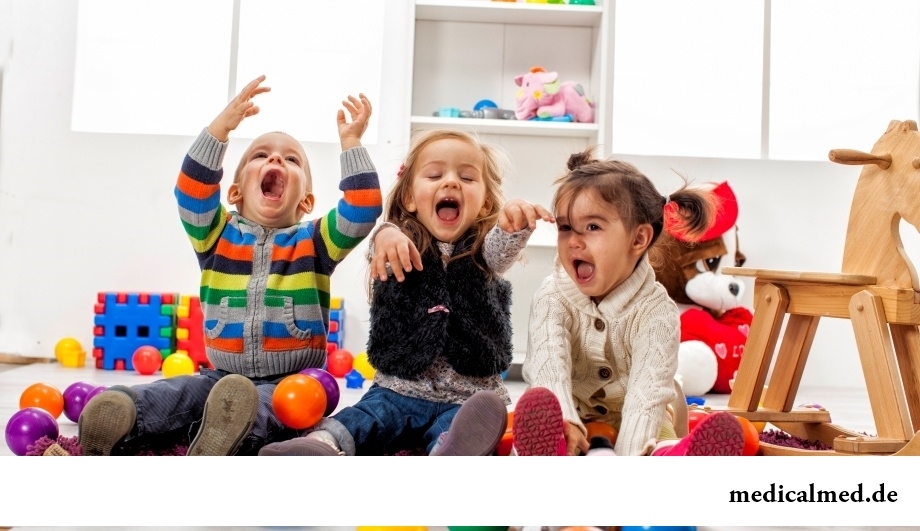
In 3-4 months prior to the beginning of new life it is necessary to acquaint the child with the place of its future "work". It is necessary to tell about what is done by children in a garden as they play, have dinner, are engaged. It is necessary to emphasize that an opportunity to attend kindergarten appeared at the kid because he matured, grew wiser, became independent. It is fine if other family members let the child know that they are proud of his progress and wait for further achievements. There is a sense to make kindergarten vicinities the place of constant joint walks that the kid saw how children play on the territory.
Specialists note the following patterns:
- The more stoutly the child owns skills of self-service, the more surely he feels in group;
- Easier those kids whose day regimen was previously corrected adapt to a garden, having brought closer it to that which is accepted in child care facility;
- It is simpler to child to learn to contact to other children and tutors if he is able to play and occupy himself independently;
- Well kids which have an experience of communication with the peers adapt. It is about the simplest skills of acquaintance, exchange of toys, conversations, game invitations etc.
It is necessary to accustom the kid to a garden gradually. Within several weeks it is worth taking away it before a lunch or right after it. It is very important that the child precisely knew when come behind him and that this rule was never violated. Bringing the baby into a garden, it is necessary to behave friendly with all children, their parents and tutors: for your kid it will be a sign of reliability and safety. Good results are yielded by establishment of rituals of farewell, a meeting, return home.
One of the most important aspects of schooling of the child to a garden is confidence of parents that such education is necessary. If someone in a family doubts it and sees a certain alternative, the kid feels it and adaptation takes place much more difficult.
There are very curious medical syndromes, for example, persuasive swallowing objects. In a stomach of one patient suffering from this mania 2500 foreign objects were revealed.

Each person supports all life a SARS about 200 times. The peak of incidence falls on cold season, but to get sick from temperatures...
Section: Articles about health
What will only not be thought up by persons interested to have a beautiful figure. Here the last innovation – for weight loss needs to be eaten greasy food. Let's understand whether there is at a fatty diet common sense....
Section: Slideshow
One of the useful properties presented to the person by the nature is ability to feel fear. This ability is designed to signal about approach of a dangerous situation and to help to avoid in advance it to keep life. However if the fear is persuasive and is not reasonable, it can seriously limit possibilities of the person in respect of socialization and self-realization. Such pathological fear is called a phobia....
Section: Articles about health
So, you resolved to lose weight. And now you try to understand what to begin with: from exercise stresses or a diet? And how to make, h...
Section: Slideshow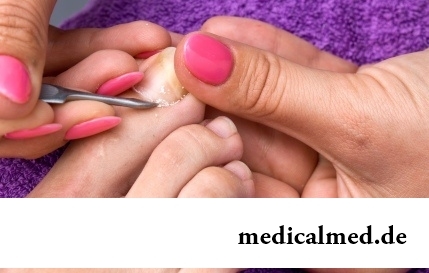
Beauty shop – the place which is associated only with positive emotions: joy, pleasure, relaxation. However visit of salon where work with biological material of clients, not always harmlessly is conducted. Today it is known Bol...
Section: Articles about health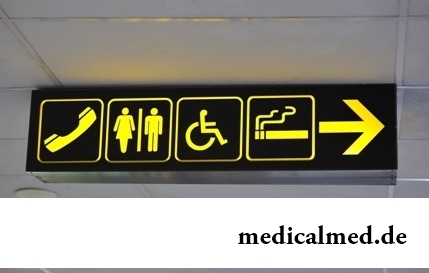
The saying "the rich do not know how the other half lives" is known to all. In a broad sense it is that we can not always understand the person whose features of a state are unknown to us. If with physiological characters of diseases the situation is more or less clearly (having noticed them, we realize that to the person nezdorovitsya), then with symptoms of the illnesses affecting the mental sphere everything is much more difficult. Not absolutely usual behavior is quite often perceived surrounding as a ridiculous eccentricity, or that much ху...
Section: Articles about health
Household skills which to us so diligently imparted in the childhood it appears, not always bring only benefit. According to result...
Section: Articles about health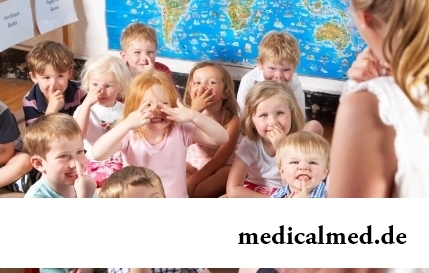
It seems, quite recently you brought the baby from maternity hospital, but time flew by, and here it is already going to join the first in life children's collective. How to prepare the child for visit of a garden? What needs to teach him to facilitate process адап...
Section: Articles about health
Run - one of the most available and effective ways to revitalize the organism. Knowing about its extraordinary advantage, each of us at least once tried to make jogs, but only the few made these occupations regular. In spite of the fact that in jogging (easy jogging), apparently, there is nothing difficult, the beginning runners often make mistakes which lead to complete cessation of trainings. Let's consider 10 useful tips for beginners who will allow them to make regular п...
Section: Articles about health
What woman does not dream of a beautiful and thick hair? So far physicians developed difficult schemes on hair transplant, in the bet industry...
Section: Articles about health
Such trouble as the milkwoman's attack, at least once in life happened almost to each woman. Prevalence of a disease is explained by the fact that the causative agent of an illness belongs to the so-called opportunistic microflora living on mucous an obol...
Section: Articles about health
Scientists always aimed to offer fundamental explanations for medical problems. Their theories formed the basis of modern methods of treatment of the hardest pathologies and helped to save a set of lives. However stories are known also such theoretical constructions, following to which brought to mankind of a trouble and torture, ruined destinies and health of many people....
Section: Articles about health
It would seem, to buy drugs in Moscow does not make a problem – a drugstore, and not one, is available for each resident of the capital in step a toast...
Section: Articles about health
Aspirin (acetylsalicylic acid) – one of those drugs which are known literally to all. It is available in each home first-aid kit, and many accept it at the first signs of an indisposition, often without having a fair idea of properties and a therapeutic eff...
Section: Articles about health
The advantage of swimming for the person is so high that this sport is not only the most popular, but also is widely applied in medicine and rehabilitation processes. If you look for for yourself the occupation allowing pleasantly and to spend time, then swimming with advantage – the fact that it is necessary for you. And give learns several facts about swimming....
Section: Slideshow
The hysteromyoma is diagnosed more than at a third of women 35 years are more senior. This high-quality new growth, which on early a stage...
Section: Articles about health
Water with a lemon - idle time in preparation drink which supporters of a healthy lifestyle already managed to appreciate. Used in a warm look and on an empty stomach, it is one of the most useful prophylactics allowing to prevent tens з...
Section: Articles about health
The climax, or menopause is the normal process of the termination of genital function of the woman which is followed by serious hormonal changes in an organism. Usually the menopause begins at the age of 50-55 years, but characteristics of this process are very individual. Factors of earlier approach of a climax are irregular sex life, numerous abortions, addictions, existence of endocrine, autoimmune and gynecologic diseases, frequent stresses and excessive hobby of diets...
Section: Articles about health
Statistically cystitis 25-30% of women up to 40 years have. With age this indicator raises, besides many do not get in to become...
Section: Articles about health
There is a lot of fans of beer in our country. Statistically, on each average Russian (including women and children) in a year about 60 liters of this drink are consumed. It is not a lot of, as in the Czech Republic or Germany, but figure all the same impressive. Radova...
Section: Articles about health
Color of plants is caused by presence at them of certain chemical compounds. Let's talk about what is meant by various colors of vegetables and fruit and what properties they give them....
Section: Articles about health
For anybody not a secret that our country is one of the most "drinking" in the world. At clear understanding of that the use of strong...
Section: Articles about health
The state of health of the person in many respects depends on chemical composition of biological liquids of an organism. Specialists consider that PH value of these solutions has to be in range of 7,35-7, 45. A deviation in the smaller party (so-called "acidulation") to a chra...
Section: Articles about health
Impossibility to conceive the child – a trouble of many Russian families. During quite long time was considered that main "culprits" of troubles such are women. Modern physicians claim that the situation is different: about a half of failures in attempts of reproduction are connected with male infertility....
Section: Articles about health
When overcomes feeling of hunger, and an opportunity to have dinner fully is absent, having a snack − small on volume comes to the rescue...
Section: Articles about health
For anybody not a secret that the modern person eats not as his ancestors. For the last 100 years in broad access there were absolutely new products which are result of use of the latest technologies in food production. Significantly changed спо...
Section: Articles about health
The popular expression "run from a heart attack" became the motto of the people supporting active lifestyle. Moreover, run became a peculiar fashionable tendency: sales of racetracks and the accompanying goods for run are at permanently high level. Whether really it is possible for one and all people and it is necessary to run to receive the portion of health, a charge of cheerfulness and good mood?...
Section: Articles about health
